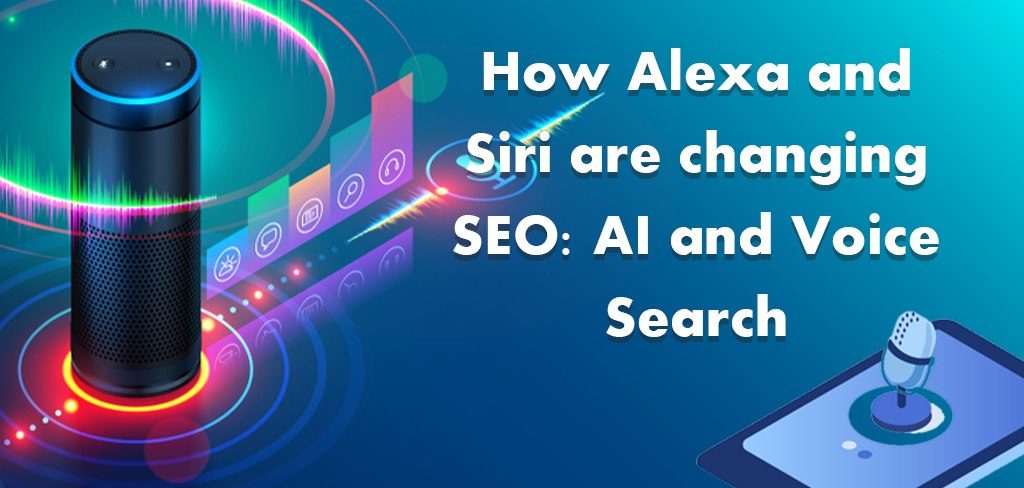“Hey Alexa! What’s the latest news today?”
“Siri what’s the weather forecast for today?”
Definitely, you might get to hear this a lot these days. And why not! Alexa and Siri are the most trending things.
10 years back, who could have thought that it would be so easy to give commands and get your work done. Well, believe it or not, this new technology is actually changing the direction of the wind.
If we take a step back and analyze, a couple of years back SEO was all about keywords and links. But now with the introduction of ‘voice search,’ the parameters are changing.
Every second person is using a smartphone these days. Be it android or apple, each one has their personal voice assistant. Siri for Apple, Alexa for Amazon and Google Assistant for Google.
Typing is becoming a thing of the past and voice search is taking over the rule now. With voice search technique setting foot into the market, it is not only changing the search methods but also digital marketing strategies.
Yes, now the digital marketing strategies are being planned keeping in mind the voice search for technological advancement.
According to the research, 50% of the search queries are placed from a mobile.
How Alexa and Siri are changing the SEO?
As a digital marketer, it is high time, you focus on the voice-assisted technology. Voice search engines have made things very convenient for the users.
Do not be surprised if in the near future everyone gives up typing and switch to voice search.
Why waste time and energy on typing when you have the luxury of speaking?
Most of the people would prefer to speak it out rather than type.
Now comes the question –
How to optimize for voice search?
The parameters for SEO optimization definitely needs to change when it comes to voice search. Think of it from a normal point of view rather than a digital marketer.
Voice search is nothing but a type of conversation between you and your phone. So the optimization should also be done keeping in mind ‘conversation’.
This means that it will turn out to be totally different from traditional keywords for SEO. There is a lot of change about what you type to search for anything and what you speak for it.
For example, while looking for a restaurant near you might type, ‘restaurants near me’ or ‘food near me’. But while speaking you may say, ‘Which are the best restaurants nearby?’
So can you see the difference? This means that keywords used for voice search have to be longer and more conversational. But this does not mean that you go for long tail keywords.
The secret is to use question-based keywords or conversational keywords.
Using words like – why can, what, will, where, which, when, who, how, are, etc as keywords are the ‘success mantra’.
Simple things to keep in mind while optimizing for voice search are:
- Google my business listing should be up to date
- Schema markup is extremely important, do not ignore it
- Keep the keywords conversational and question-based
Ok, a lot can be discussed about Alexa and Siri, but there is one more question that troubles the mind.
How voice-assisted search is changing searches?
Google search completed its 20 years in 2018. Over the last 2 decades, there has been multiple changes and up-gradation. Since its inception, Google’s mission statement has been “to organize the world’s information and make it universally accessible and useful.”
Now that the search behaviors are changing worldwide, it should be by default understood that SEO needs change.
Coming back to the question of how it is changing.
Earlier people used to type in the search bar. Now people speak to the search bar. Interesting..isn’t it?
Well of course, with the advancement in technology this was destined to happen.
A couple of decades back William Tunstall-Pedoe was possibly the first one to even think of the idea of speaking to the machines. He believed that “the technology should work more like the ship’s computer on Star Trek: Ask a question in everyday language, get an instant, perfect answer.”
This very thought is now the most trending way of search – voice assistant search.
Now that you don’t have to type anything while searching the net, isn’t it obvious that things behind the stage ought to change?
If not sure till now, these figures will clear your mind.
While in 2017, only 2% support operation and customer support agencies were using voice recognition technique, the number is like to leap up to 25% by 2020.
It is not just the search engine but almost everything is being redirected and being assisted by voice search.
Take a look at the next one.
Location and navigation searches
How many of you have tried this… “hey Google, take me to the nearest ATM” and google maps starts to guide, “nearest ATM is 650 m away.” “Turn right after 200 m and then turn left.”
I don’t know about you, but this has saved me from getting lost several times.
Finding ways and road maps have become far much easier with location and navigation assistance.
If you are new to a place and looking for some particular address, all you have to do is feed in the address to google maps and the rest is done.
Google maps literally show you the direction along with voice assistance to turn right or left.
Since the users are getting smart with searching for exact results, you should too. With VSO (Voice Search Optimization) taking over the traditional SEO, it is time to update your business listing.
People now will ask Google, “restaurant near me”. Now if you own a restaurant and have still not added maps and navigation in your business listing, you will be left out.
Surely you do not want to miss out on customers because of the faulty or incomplete business listing. It is time to update your maps and navigation details as per the voice search parameters.
From the very beginning, I have been repeating about keeping it conversational and question-based. Just to make sure you are clear, let’s do it once again.
How did FAQ pages work for voice search?
VSO (Voice Search Optimization) is practically the verbal revolution in the digital world. And revolutions always come along with changes. Hence the shift from text search to voice search.
Do not skip to the next point before going through these stats about voice search.
Why people are shifting to voice search?
- 61% of the users believe that voice search is useful when hands and vision are occupied.
- 30% of the users believe that voice search gives faster results compared to text search.
- 24% of the users have opted for voice search, while facing difficulty, typing on mobiles.
- 22% use voice search because it is cool and fun to try something different.
Interacting with your phone is obviously fun. But the challenge here is one side of the interaction is a human and the other side is a machine.
To overcome this issue, the voice search technique is being made as human-oriented as possible. And therefore here comes the ‘mantra’ again – keep it conversational and question-based.
Think of it logically. If you are talking to someone would you think twice before asking a question? Or would you focus on words to include in your question to get the right answer, while talking to a human?
No, you would not. You would just ask in the way that first comes into your mind.
Similarly, while asking a question to Google, you would not sit and think, reframe and then ask the question right?
So again coming back to where we started – Keep it conversational and question-based.
Frame your FAQ’s the way you would ask a question to any human.
Structured Data, plays a major role for VSO
All the marketers out there competing to be visible as the featured snippet must be aware of structured data.
Schema markup or structured data is not rocket science. Search engines may be picky and choosy, but we have to be smart enough to make them choose us.
All you have to do is provide schema markups and proper information for indexing. Basically, structured data is a way of providing hints and clues to Google crawlers about what the page is all about.
Create a well-organized page with all the information. Include descriptive tags and microdata in the coding. Because search engine crawlers are most likely to pick up sites that are more organized with structured data.
You might be wondering since structured data is not visible to the user’s why even take the pain to include it in your content.
Well, the answer to this is, it may not be visible to users, but it is visible to search engine crawlers.
Now you might be wondering –
How structured data is linked to voice search?
The connection is very simple.
If a user is searching for any local business, he might be interested in knowing the location, working hours, maps, direction, contact info, etc. Now, these are exactly the metadata or the structured data I am talking about.
If your page does not have all this information, it will not show up on the voice search page results on a search engine.
Let me take another example. You are looking for a pasta recipe. You would probably say, “Ok Google, how to make white sauce pasta?”
Now to this voice search query, Google is likely to list down the recipes which have the most organized and detailed information. Like it will show results that will show, type of pasta, calories contained, preparation time, etc.
So if you want your pasta recipe to pop up on the top, you will have to make sure all this structured data is included in your coding.
Now let us explore one more perspective of the voice search revolution.
Smartphone search vs. smart speaker
A lot has already been discussed why the need to optimize for voice search. So let us straight jump to the point.
- According to the data, 27% of the online population around the world is using the voice search feature on mobile.
- Other statistics say that more than one-third of the online population globally are interested in buying voice-controlled voice assistant.
These figures should make it clear that voice search is climbing up the mountain rapidly and has no intention of coming down. At Least not in the near future.
Be it Google assistant on Android smartphones or Amazon’s Echo speakers, more and more people are getting inclined towards voice assistants.
Now the only major difference between smartphones and smart speaker voice assistants is their reachability.
Talking about smartphones, you need to touch the screen before initiating the search speech. Or at least you have to open the Google page and then speak something to get results.
While smart speakers are always built to automatically listen all the time. But even for these speakers, you may not have to touch them but there are some ‘wake up’ words for them too.
For example, to wake up Google Assistant speaker, you will have to say, “Ok Google” or “Hey Google”. For Amazon’s Echo, you have to say, “Echo or Alexa” etc.
Now if we take a look up to the first line of this article, one thing that still is constant is, the need to change the traditional SEO to trending VSO.
Voice search has been in the talks for a couple of years now and plans to be on top for a few more coming years.
Therefore, without waiting any longer, optimize your content now for voice search. A brief summary for you is:
- Use conversational and question-based keywords
- Use structured data (Schema)
- Keep the content well organized
- Think like a layman talking to another human
Don’t wait any longer, optimize the content now..!






Its like you read my mind! You appear to know a lot about this, like you wrote the book in it
or something. I think that you can do with a few pics to drive the message home a bit, but instead of that, this is great blog.
A great read. I will definitely be back.